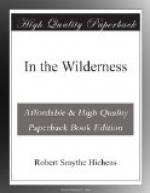III
A FIGHT WITH A TROUT
Trout fishing in the Adirondacks would be a more attractive pastime than it is but for the popular notion of its danger. The trout is a retiring and harmless animal, except when he is aroused and forced into a combat; and then his agility, fierceness, and vindictiveness become apparent. No one who has studied the excellent pictures representing men in an open boat, exposed to the assaults of long, enraged trout flying at them through the open air with open mouth, ever ventures with his rod upon the lonely lakes of the forest without a certain terror, or ever reads of the exploits of daring fishermen without a feeling of admiration for their heroism. Most of their adventures are thrilling, and all of them are, in narration, more or less unjust to the trout: in fact, the object of them seems to be to exhibit, at the expense of the trout, the shrewdness, the skill, and the muscular power of the sportsman. My own simple story has few of these recommendations.
We had built our bark camp one summer and were staying on one of the popular lakes of the Saranac region. It would be a very pretty region if it were not so flat, if the margins of the lakes had not been flooded by dams at the outlets, which have killed the trees, and left a rim of ghastly deadwood like the swamps of the under-world pictured by Dore’s bizarre pencil,—and if the pianos at the hotels were in tune. It would be an excellent sporting region also (for there is water enough) if the fish commissioners would stock the waters, and if previous hunters had not pulled all the hair and skin off from the deers’ tails. Formerly sportsmen had a habit of catching the deer by the tails, and of being dragged in mere wantonness round and round the shores. It is well known that if you seize a deer by this “holt” the skin will slip off like the peel from a banana—This reprehensible practice was carried so far that the traveler is now hourly pained by the sight of peeled-tail deer mournfully sneaking about the wood.




